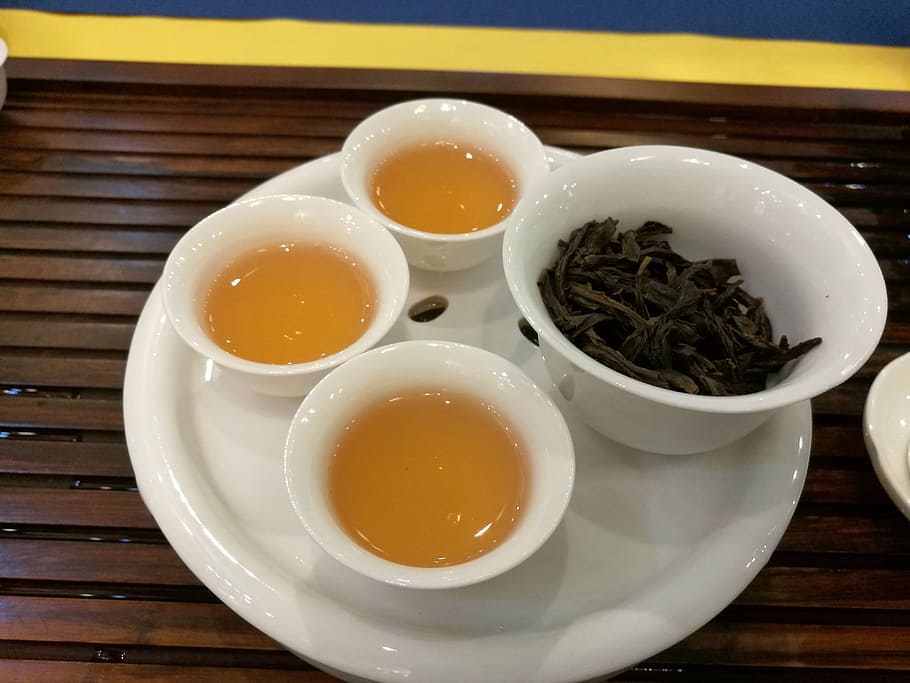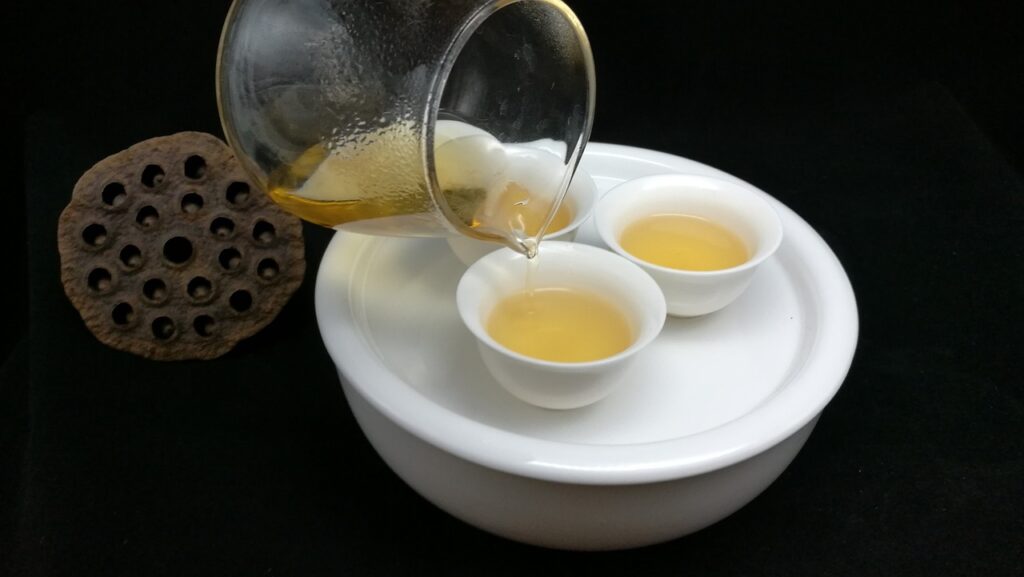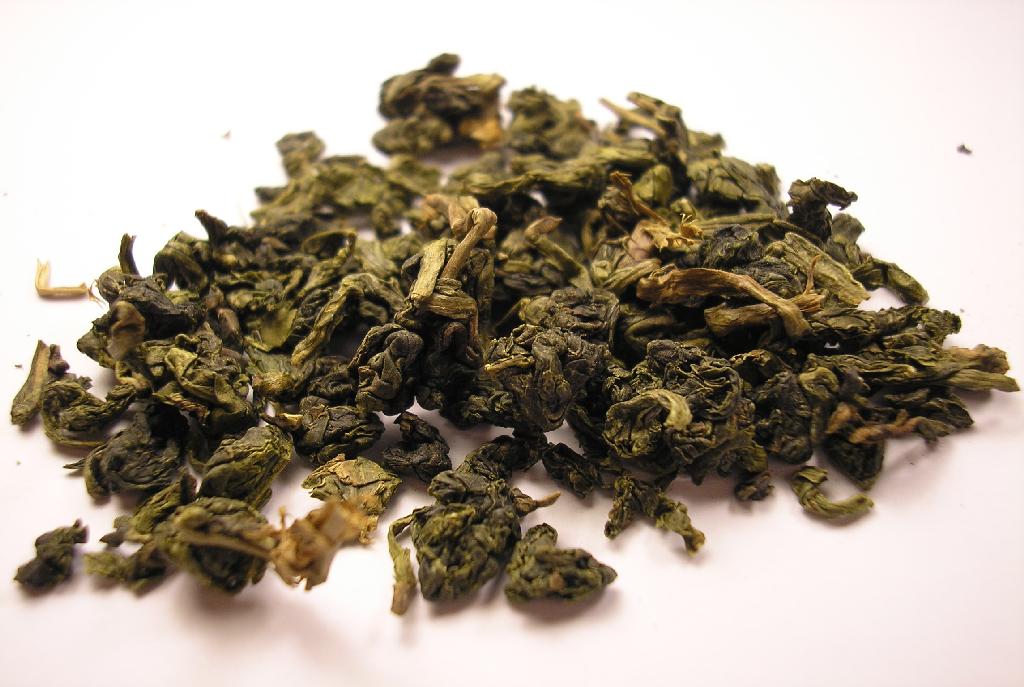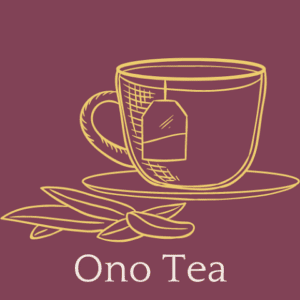GABA Oolong Tea is made from the same plant family that makes green tea and black tea: the Camellia Sinensis plant. You might wonder, if it’s from the same plant family, what sets it apart from the rest?
GABA Oolong tea has a unique composition and taste and comprises gamma-aminobutyric acid (GABA). GABA is a vital neurotransmitter primarily concerned with regulating mental alertness and inducing relaxation (by neuronal inhibition).
Drinking GABA Oolong Tea is more than consuming an ordinary beverage since it has multiple health benefits. Many people regularly consume GABA Oolong Tea for the sake of getting rid of stress and anxiety, which makes it ideal for those who are seeking mental peace.
In the following sections, we will dive deeper to understand the process of producing GABA Oolong Tea, unearth its multiple health benefits, etc.
How Is GABA Oolong Tea Produced?
In this section, we will explain to you how GABA Oolong Tea is produced, from the start when tea leaves are carefully selected until the time when it is dispatched in packs for the people.
Harvesting and Selection of Tea Leaves
Camellia Sinensis plant leaves are the foundation of GABA Oolong Tea. The process begins with harvesting the Camellia Sinensis plant and then selecting its finest organic leaves.
Plant leaves are selected from the most reliable gardens, which are renowned for using premium-quality cultivation methods. Then the tender tea leaves are hand-picked, which ensures the leaves will produce exceptional flavor.

Importance: Hand-picking premium tea leaves means that the leaves that have the potential to be flavorful and those that produce a nice aroma are selected.
In addition, only premium-quality leaves would be able to vouch for an exceptional taste and the potential health benefits claimed.
Withering and Oxidation
Once the tea leaves are harvested, they undergo the processes of withering and oxidation in order to produce the desired aroma and taste.
The tea leaves are collected in trays and left to wilt in well-ventilated conditions. This is done to reduce the moisture content of leaves, which can be the reason for delayed leaf processing.
Furthermore, a controlled withering process means the enzymatic activity would be enhanced, and the tea would have an exceptional taste and aroma.
To provide leaves with a premium taste, they undergo a process of controlled oxidation. The extent of oxidation deeply impacts the flavor characteristics of the leaves.
Oxidation transforms the polyphenols present in the tea leaves, which are responsible for the multiple flavors of GABA Oolong Tea.
GABA Formation
The best part about GABA Oolong Tea is the formation of gamma-aminobutyric acid (GABA), which is responsible for several health benefits.
The production of GABA begins with the introduction of nitrogen gas to the leaves, which stimulates the conversion of glutamic acid to amino-butyric acid (GABA).
Nitrogen behaves as a catalyst in this conversion by creating an oxygen-free environment, which results in an efficient conversion to produce GABA.
Glutamic acid is a natural precursor of GABA inside the Camellia Sinensis plant’s leaves. When an oxygen-free environment is created with the aid of nitrogen and the use of enzymes, an increased amount of GABA is produced.
When consumed, GABA allows the consumer to feel at ease as it relaxes the mind (due to neuronal inhibition), making it a beverage many look forward to.
Health Benefits of GABA Oolong Tea
GABA Oolong Tea has earned the reputation of being a soothing beverage that reduces stress and induces relaxation. Here is how GABA triggers the central nervous system (CNS), helping with anxiety and creating a state of calmness.
Stimulation on the CNS
GABA, or gamma-aminobutyric acid, is a neurotransmitter that is essential for the brain to perform its actions.
When a consumer drinks GABA Oolong Tea, the brain gets an extra supply of GABA, which is then further utilized to relax the overexcited neurons and further slow the brain signaling process.
By performing these actions, GABA is able to relax the mind and induce a state of calmness.
GABA for Anxiety Management
Managing anxiety is one of the most attractive traits of GABA Oolong Tea. When consumed, GABA then begins to interact with GABA-A and GABA-B receptors in the brain, which then inhibit the increased neuronal transmission of stress signals.
Once this is achieved, the anxiety levels drop, which results in mental and physical relaxation.
Incorporating GABA-Oolong Tea into Your Daily Routine
You can either begin or end your day by brewing a cup of GABA Oolong Tea in the morning or at night. By drinking GABA Oolong Tea in the morning, you can get mental clarity to start your day and plan a productive day.
Or if consumed at night, it could help you with the stress and exhaustion after a hard day at work. You may drink GABA Oolong Tea while you are on a break.
While you are sipping your tea, you can embrace the taste and the calming effect produced by it. In addition, you may also drink it while you practice calming activities such as deep breathing or meditation to produce an enhanced effect.
You could keep an extra supply of GABA Oolong Tea at work, which can help reduce stress levels.
Effect of GABA Oolong Tea on Cardiovascular Health
GABA Oolong Tea not only has positive effects on the CNS, but it also supports your cardiac health.
Role of GABA in Regulating Blood Pressure
Hypertension, or high blood pressure, is a common problem among adults and elderly individuals worldwide.
GABA acts as a neurotransmitter and regulates blood pressure. It does this by relaxing the blood vessels; as the vessel’s diameter increases, blood can flow smoothly, and hence hypertension is reduced.
Role of GABA in Maintaining Cardiac Health
A healthy heart is the foundation of a healthy, functioning body. GABA Oolong Tea provides a natural option for supporting cardiac health.
Those who regularly consume GABA-oolong tea are at lower risk of developing cardiac diseases and have overall improved cardiac activity. The fact that GABA can relax the blood vessels means it can decrease the strain on the heart, which then promotes better blood circulation and reduces any chances of cardiovascular complications in life.
Furthermore, the GABA Oolong Tea comprises a vast variety of polyphenols and oxidants that have anti-inflammatory properties. The presence of these compounds means that the body can now combat oxidative stress and hence reduce the chances of heart-related ailments.

Focus and Clarity with GABA Oolong Tea
Have you ever experienced a crisis where you struggled to concentrate at work? If so, then you would be delighted to explore the effects of GABA Oolong Tea on your mind to enhance mental alertness.
GABA provides a natural way to boost your focus and give you mental clarity, making you energized and sharp. In this section, we will discover the connection between GABA and cognitive function and how it affects mental performance.
GABA and Cognitive Function
GABA is a vital neurotransmitter that plays many roles in regulating brain activity. Once it interacts with the GABA-A and GABA-B receptors in the brain, it is able to inhibit neuronal transmission.
Then a state of tranquility is induced. However, multiple recent types of research suggest that the role of GABA is more than neuronal inhibitions, as it is able to impact cognitive function as well.
Impact of GABA on Boosting Focus and Mental Clarity
GABA Oolong Tea has shown positive effects on enhancing mental alertness. It is able to do this with the aid of alpha brain waves.
As alpha brain waves are produced, GABA then promotes a state of wakeful relaxation, which is responsible for maintaining focus and providing mental clarity.
As a result, you are able to remain focused throughout your work without experiencing stress.
Other Potential Health Benefits of GABA Oolong Tea
GABA Oolong Tea holds the secret mantra of nourishing your body and mind through the naturally occurring compounds present in the tea leaves. There is more to GABA Oolong tea than its flavor and aroma.
In this section, we will discover the other potential health benefits of GABA Oolong tea that are related to its antioxidant properties. In addition, we will explore its role in weight management and metabolism.
Antioxidant Properties
GABA Oolong Tea comprises naturally occurring antioxidants that are renowned for enhancing overall health and vitality. The antioxidants are able to combat the harmful free radicals that exist in the body, thereby decreasing oxidative stress and protecting healthy cells from damage. If you incorporate GABA Oolong Tea into your life, you will be able to enjoy the benefits.
The antioxidants present in the GABA Oolong Tea provide your body with an improved immune system that can combat illness and infections, and it is able to defend itself against inflammation. In addition, it is able to support the healthy functions of the cells, allowing your body to combat toxins and maintain mental wellness.
Sipping GABA Oolong Tea may have you raising a cup to youthful radiance. The antioxidants help the body neutralize the free oxygen radicals that lead to premature aging and hence promote healthy-looking skin and reduce the appearance of wrinkles. Sip a cup of GABA Oolong Tea as part of your daily skincare routine.

Managing Weight and Supporting Metabolism
GABA Oolong Tea can serve as a secret weapon for you if you desire to maintain your weight and support your metabolism. The tea offers a natural way to aid you while you work hard to maintain your weight.
Furthermore, GABA-rich Oolong Tea can help you support your body’s metabolism. It does this by activating certain enzymes that, in turn, help break down fatty acids readily and, hence, maintain weight and promote a healthy body.
Due to the presence of gamma-aminobutyric acid (GABA) and several other compounds, GABA Oolong Tea can assist by enhancing energy levels and triggering a sense of satiety.
If you begin to consume it regularly, you can begin to experience fewer odd cravings and a sense of fullness, which then supports your weight management efforts.
Role of GABA in Sleep Disorders
GABA Oolong Tea is a natural solution for you if you suffer from a sleeping disorder. Gamma-aminobutyric acid (GABA) acts as a neurotransmitter and helps by regulating neuronal activity and then inducing a state of tranquility.
Not to mention, it promotes mental calmness and mental well-being; therefore, it helps by improving sleep quality and offers solutions against insomnia.
GABA Oolong Tea – Safe to Consume?
GABA Oolong Tea is generally safe for almost everyone. Nonetheless, you need to be mindful of any potential allergies or your sensitivity to this tea.
If you suffer from a certain health concern or if you are on medication, then we advise you to consult your physician before consuming GABA Oolong Tea.
Your physician would be able to provide you with guidelines according to your situation and assist you with a safe method of incorporating GABA into oolong tea. It is better to be safe than to be reckless and risk your health.
Comparison of GABA Oolong Tea with Black Tea and Green Tea
While all three of these teas are derived from the Camellia Sinensis plant, the processing methods differ from each other, which results in their distinct characteristics. GABA Oolong Tea comprises gamma-aminobutyric acid (GABA), which offers mental relaxation and mental clarity.
On the contrary, green tea is produced by pan-frying or steaming the tea leaves, resulting in an antioxidant-rich tea that is well renowned for its refreshing and grassy flavor. Globally, green tea produced in Japan is the most popular.
On the other hand, black tea is completely oxidized and has a robust flavor. It contains theaflavins and thearubigins, which are responsible for supporting cardiac health.
All of these teas have their own distinct characteristics and potential health benefits.
GABA Oolong Tea: Better Hot or Cold?
GABA Oolong Tea is versatile, and therefore, you can enjoy it in both forms, whether hot or cold, according to your preference. When you drink a hot cup of GABA Oolong Tea, you experience a comforting and soothing feeling, making it perfect for enjoying your calm evening.
However, if you drink a cold cup of tea, it offers a refreshing feeling, which makes it a revitalizing beverage during the summer.
Nonetheless, feel free to experiment with different preparations to decide what temperature and brewing method are best according to your preferences.
Conclusion
To summarize, GABA Oolong Tea is an organic tea that positively affects the physical and mental health of the consumer. By being cautious through the processing period, GABA-rich tea is produced and then widely sold in the market.
Regular consumption of GABA Oolong Tea carries a series of health-related benefits. Due to its inhibitory characteristics, it can induce relaxation and play a role in reducing stress and managing anxiety levels.
Those who struggle with stress can rejoice and feel mental well-being after its consumption. Individuals who are struggling to maintain their weight can use it to support their metabolism, as GABA enhances fat breakdown and triggers a sense of fullness.
Individuals who want to prevent the risk of developing cardiac complications use it regularly for treating hypertension, as GABA relaxes their blood vessels and ensures smooth blood flow.

